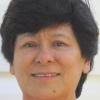The author, shown with her parents, made her perpetual profession in San Fernando, California, on Aug. 3, 1996. (Courtesy of Maria Elena Mendez Ochoa)
Editor's note: In recognition of the invaluable contribution that migrants provide to our communities, the United Nations has declared Dec, 18 as International Migrants Day. Both their home and host nations benefit from the contributions of these individuals, who perform various roles as workers, students, artists and more. At Global Sisters Report, we seek to honor the profound positive impact of countless individuals who have improved our country by enriching it with their unique cultures and traditions. We extend our heartfelt gratitude for their dedicated service in hospitals, schools and parishes, among other places. Our nation is richer and more dynamic because of you.
Family migration has profoundly shaped my life since my birth in 1964. During my childhood, memories of my father were scarce as he would temporarily travel to Mexico, then return to the United States to work in California fields through the Bracero Program. In his absence, our home was led by a single mother, caring for her growing family of 12.
My father wasn't the sole migrant from our community; many men from the area and neighboring towns followed a similar path. Eventually, entire families, including ours, joined this migration trend. Undoubtedly, the experience of migration left an indelible mark on my life.
In 1973, my pregnant mother came to the United States, where my father was, and after three months, they returned to Mexico with their newborn twins. On May 6, 1984, my parents, along with my younger siblings, embarked on the journey to the United States, leaving behind two sons (ages 12 and 15) and myself (age 19), who would later emigrate. At that point, only three of the fourteen family members remained in Mexico.
Amid these familial changes, I felt a calling from God to religious life between the ages of 13 and 18, discerning His plans for my life. By the time I was 18, I was certain about my desire to become a nun. However, with my parents' decision to move to the United States, I had to take on the responsibility of caring for my two younger brothers.
Fr. Salvador Nuñez Lopez, from the Diocese of Zamora, Michoacán, Mexico, gives the author her cross on the day of her profession at the Sanctuary of Our Lady of Guadalupe in Morelia, Michoacan, on Aug. 15, 1990. (Courtesy of Maria Elena Mendez Ochoa)
When my mother shared her decision to emigrate, I expressed my concern, saying, "If you leave, my plans will fall apart." She reassured me, saying, "No, if you want to go, you go, and I will see how we manage it." Father Salvador, my parish priest, who accompanied me on my spiritual journey, knew about my parents' absence and my vocational discernment.
In June 1984, father Salvador informed me, "You are already accepted in Irapuato; you will enter on August 25." Despite my initial silence, he sensed my internal conflict and asked, "Aren't you happy?" I replied, "Yes, but I am going to leave my brothers and my Joya" (Jewel). He reminded me, "You are leaving your Joya (the place of my birth) to gain a better one. As for your brothers, I will write a letter to your mom to see what we can do."
From that point, the preparation for detachment from my brothers, my hometown and my ordinary activities began as the certainty that God was calling me to religious life solidified. On Aug. 25, 1984, the day arrived for me to leave La Joya. Father Salvador, who was supposed to pick me up at 8 a.m., had to wait longer as each person who came to see me off delayed the moment. Tearful goodbyes and prolonged hugs characterized the farewell, set against the backdrop of the radio playing "Stop crying, little girl, stop crying, my love. Although I will go far away, someday, I will come back for you, my love … " by the Earthlings.
As I left my home, my brothers accompanied me with the suitcase on their head, making it seem like a funeral, with everyone crying. When I finally reached the place where Father Salvador awaited me, I entered the car, and he began to pray the rosary as I sobbed. It was a poignant moment, and he later mentioned it was the longest rosary of his life. I chose not to look back at La Joya, recalling Jesus' words not to look back (Luke 9:57-62).
Advertisement
The certainty that God was calling me and Father Salvador's words, "You are leaving your Jewel to gain a better one," provided assurance that God is the best Jewel one can find, even amid challenges. Now, my family and I are in the United States, navigating the complexities of immigration, but our identity is marked by both Mexico and the United States.
The call to religious life, alive since my teenage years, persists today. It aligns with Pope Francis' notion of the "spirituality of 'new beginnings,' " emphasizing the desire to overcome fear and uncertainty and to cast my nets into the deep (Luke 5:1-11) again, confident that Jesus is in the boat. It's a call to avoid complacency and draw from the enthusiasm to rekindle "the restlessness for the Gospel."
Just as God called me to religious life within a migrant family transitioning between Mexico and the United States, He continues to call young men and women to have a personal experience with Jesus and the Gospel. As someone in religious life, I am reminded to renew the passion and enthusiasm of "First Love," the love that guided my decision to "leave my Jewel to gain a better One," as Father Salvador told me 39 years ago when I was accepted into religious life.




